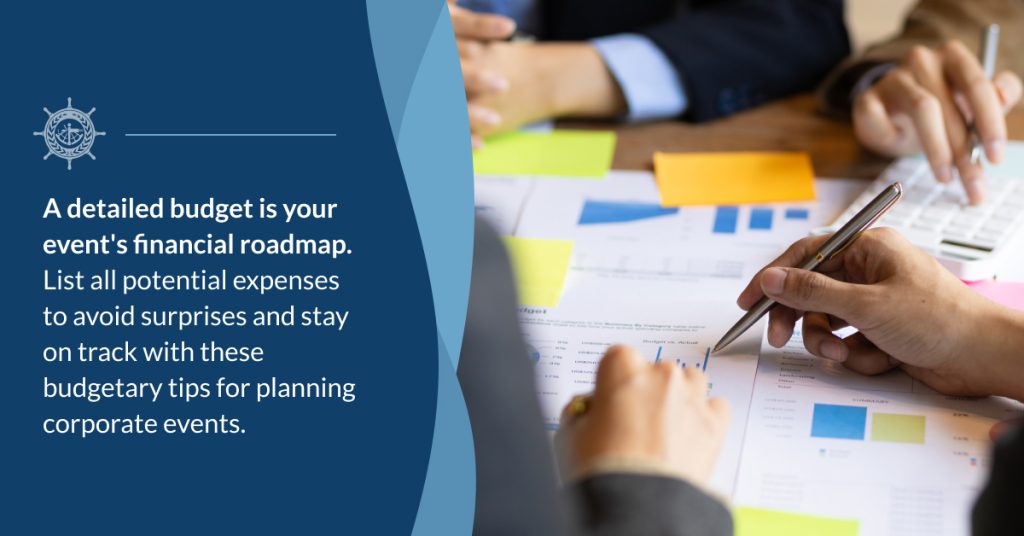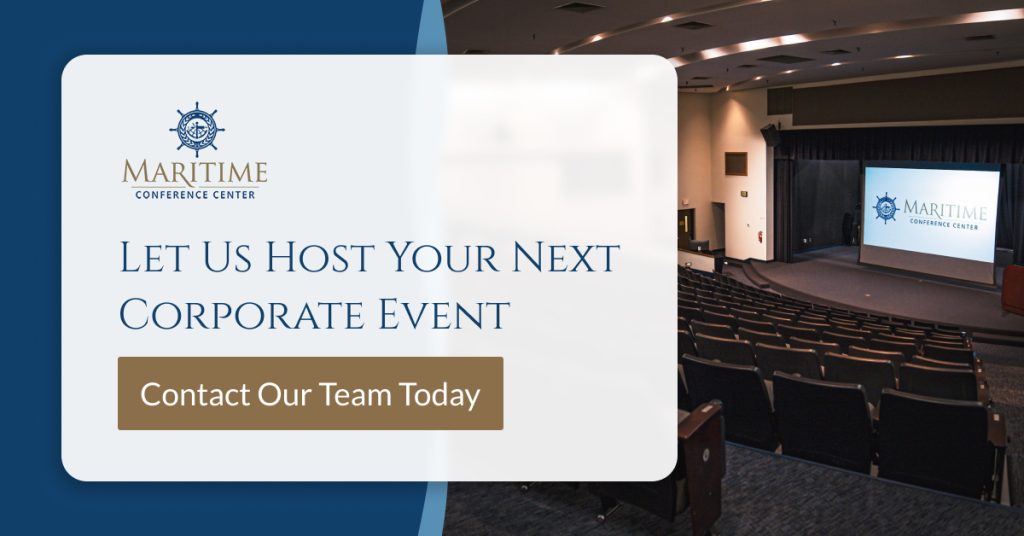Planning a corporate event for a union, association or business is a strategic undertaking where every detail counts. From defining objectives to coordinating logistics and creating a memorable experience for attendees, the process can feel daunting.
This corporate event planning guide breaks the process into actionable steps, eliminating the guesswork involved in delivering corporate events that meet your organization’s goals and leave a lasting impression.
Define Your Event’s Core Purpose
Before getting into the nitty-gritty of logistics, define what you would like to achieve. Clearly thought-out goals will guide every decision you make so your event delivers genuine value to your organization and attendees.
These five essential elements provide an excellent starting point when deciding how to plan a business event.
1. Mission
Ideally, start preparations at least six months in advance. Begin by defining your primary mission. Is your goal to provide training, organize a team-building retreat, encourage networking or launch a new product?
Clarifying the purpose at the outset will help you make informed decisions about how to organize the business event so every element supports your overarching mission. Tips for creating a mission statement include:
- Ask why the event should exist
- Use positive words that inspire
- Be clear and concise
- Focus on achievable action
- Use as a map from planning through post-event debriefing
2. Audience
Is your primary audience union members, corporate teams or association representatives? Apply the same marketing principles you would use to define a customer audience, even when planning an internal event for employees. Start with broad demographics like age, gender, education and job title, then drill down into interests and lifestyle.
Understanding who will attend is undoubtedly one of the best practices for corporate events. It allows you to tailor your objectives, content and activities to their needs and expectations. The result is a relevant and engaging experience for everyone involved.
3. Objectives
SMART is a mnemonic device to help you remember five qualities every goal should have — specific, measurable, achievable, realistic and time-bound. For example, instead of a vague goal like “improve event engagement,” set a target such as “host a half-day retreat with three interactive workshops, with at least 80% of attendees participating in all sessions.” This approach provides a concrete benchmark for success and shapes better decision-making.
4. Alignment
Your event’s purpose should align with your organization’s broader priorities. Whether your focus is on compliance training, leadership development or industry networking, connecting your event goals to organizational objectives will teach you how to organize a corporate event that supports long-term business strategies and delivers meaningful value.
5. Collaboration
Finally, document your goals and share them with your planning team. Keeping everyone informed and aligned from the beginning maintains focus, encourages collaboration and increases the likelihood of a successful, well-coordinated event.
How to Plan Corporate Events on a Budget

A detailed budget is your event’s financial roadmap. List all potential expenses to avoid surprises and stay on track with these budgetary tips for planning corporate events.
- Venue rental
- Catering
- Audiovisual equipment
- Speaker fees
- Travel costs
- Accommodation
- Swag/gift bags
- Printing
- Décor
Research all-inclusive venue packages for corporate retreats that bundle costs like meals and audiovisual services to streamline your budget. Compare quotes from multiple vendors, but prioritize value and reliability over the lowest price. Finally, track expenses in real time and adjust allocations as needed to prevent overspending.
If possible, allocate a contingency fund of 10% to 15% of your total budget to cover unexpected costs that may crop up.
Assembling Your Event Team and Timeline
Event planning is rarely a solo effort. Delegate tasks to people who will handle them effectively, ensuring nothing falls through the cracks.
Designate an event lead to oversee the entire process and make final decisions. Next, assign team members to specific areas like budget management, marketing and communications, registration and on-site logistics. For larger events, consider appointing subcommittees for areas like hospitality, technology and attendee engagement.
Now, work backward from your event date to create a project timeline and set firm deadlines for milestones like booking a venue, sending invitations and finalizing the agenda.
If you’re still learning how to plan events for corporations, many tools can take the effort out of pulling off an exceptional function. For example, Eventzilla integrates with your existing tools, and Bizzabo for B2B events will keep everyone on track and accountable.
Picking a Venue and Date
As a backdrop, your venue should align with your goals and audience needs.
- Capacity, location, accessibility and available amenities.
- On-site accommodations for multiday events or attendees traveling from afar.
- Technology offerings like reliable Wi-Fi, audiovisual equipment and hybrid meeting capabilities.
- Check for potential date conflicts with holidays or industry events before finalizing.
- Inquire about the venue’s experience with similar events and what support their staff provides.
- Ask about bundled packages that include meeting space, accommodation and catering.
Creating an Engaging Event Agenda
A well-structured agenda keeps attendees engaged and allows you to meet your event objectives. A mix of sessions and activities can boost participation and satisfaction. One of the top tips for planning corporate events is to use attendee feedback or pre-event surveys to tailor session topics and formats. Remember to build in flexibility to accommodate last-minute changes or special requests.
Balance formal sessions like keynote presentations and workshops with informal networking breaks where attendees can relax and connect organically. For training-focused events, include breakout sessions for small-group discussions and hands-on activities. Block out time for meals and social events to foster relationship-building.
Corporate Event Checklist for Day-Of Success
A final run-through of logistics is essential for a smooth event. Use this checklist to ensure you don’t overlook anything on the big day.
Confirm Vendor and Speaker Details
Book the keynote speakers for your event at least three months in advance. Two to four weeks before the event:
- Touch base with all vendors to confirm arrival times and setup requirements.
- Provide speakers with a final agenda and make sure they have the technical support they’ll need.
- Double-check dietary requirements and special requests with catering staff.
Prepare On-Site Materials
As your attendees arrive, meet them with streamlined efficiency and a few surprises:
- Set up registration and information desks for attendee check-in.
- Organize name badges, printed agendas, signage and handouts.
- Fill goody bags with essential supplies, including schedules, writing supplies and branded gifts like wireless chargers or locally sourced snacks.
Conduct a Final Walk-Through
The pre-event walk-through is one of the best practices for corporate events. It’s an excellent way to catch last-minute challenges and alleviate anxiety.
- Walk through the venue to ensure the layout is correct.
- Test all equipment, noting anything that doesn’t work properly.
- Check that signage is clear and accessible.
- Review emergency procedures and contact information with your team.
- Do a final check-in with event speakers and vendors.
Measuring Success and Gathering Feedback
The work isn’t over when attendees leave. Evaluate its success to prove its ROI and build a foundation for future events.
Place a brief post-event survey in every attendee’s goody bag or send a follow-up email asking attendees to weigh in on their experience, the sessions and the venue. Review feedback with your team to identify strengths and areas for improvement. Then, hold a debriefing session to analyze performance against your initial SMART goals. Did you meet your targets for lead generation, attendee satisfaction and other essential metrics?
Share outcomes and takeaways with stakeholders and sponsors and use these insights to plan future corporate events.
Let Us Host Your Next Corporate Event

Your venue defines your event. A thoughtfully chosen space adds credibility and sets a tone that leaves attendees talking about their experience long after it ends.
Maritime Conference Center is hospitality-focused and technology-driven. We offer expansive event packages designed to simplify your planning process. With on-site accommodations, versatile meeting spaces and full-service catering, we provide everything you need to host successful meetings, trainings and conferences.
Contact our team today to learn how we can support your next event.

